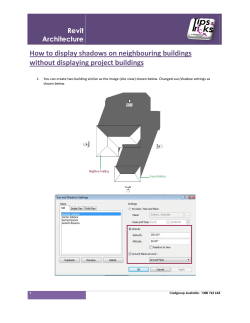
How to Get the Final Lightcurve from Occultation Image Sequences or Lessions, which have to be learnt one day
International Occultation Timing Association
* European Section *
How to Get the Final Lightcurve from Occultation Image Sequences
or
Lessions, which have to be learnt one day
Wolfgang Beisker
International Occultation Timing Associatio, European Section
München, Beisker@gsf.de
International Occultation Timing Association
* European Section *
The measurement of the ocultation is not the only
thing, what we have to do!
Dark Frames
Flat Fields
Reference Images
And what we have to do in the lab before?
Linearity (Gamma factor)
What are reference images for?
International Occultation Timing Association
* European Section *
Correction of linearity curve for ~ 5000 images
Therefore: software required with batch proc.
Best: Image format FITS
Which software???
MIDAS: This package can do all the job
IRIS:
Arithmetics is problematic, if in
batch mode
International Occultation Timing Association
* European Section *
Recording of images:
IOC : Special movie files, can be converted to FITS files
using mov2fits software
Toucam (IOClight), Videocamera, Logitech etc
using QASTROCAM
Direct FITS files, with timings!
using IRIS, GIOTTO,... if speed is necessary, only AVI files
Conversion to FITS by IRIS, AVIEDIT etc.
International Occultation Timing Association
* European Section *
IMPORTANT: At the end, we MUST have a sequence of FITS images...
IOC
IRIS
TC001.fit
TC002.fit
TC1.fit
TC2.fit
TC009.fit
TC010.fit
TC011.fit
TC9.fit
TC10.fit
TC11.fit
TC099.fit
TC100.fit
TC101.fit
TC99.fit
TC100.fit
TC101.fit
Both sequenes work, IRIS
allows conversion from IOC
mode to IRIS mode and for
MIDAS it can be programmed
anyway
International Occultation Timing Association
* European Section *
3com home connect
toucam default
225
225
200
200
175
1.0
175
150
150
125
1.45
125
100
100
75
75
50
50
25
25
0
0
0.0 0.1 0.1 0.2 0.2 0.3 0.3 0.4 0.4 0.5 0.5 0.6 0.6 0.7 0.7 0.8
5
5
5
5
5
5
5
5
0
0
0.1
0.2
0.3
0.4
0.5
0.6
0.7
0.8
Intensity vs. Expotime
120
110
Raw mode
toucam (Etiennne
Bonduelle...)
100
90
80
70
1.0
60
50
40
30
20
10
0
0
25
50
75
100
125
150
175
200
Exp. Time [msec]
International Occultation Timing Association
* European Section *
Example:
DEFINE/PARAM P1 ? IMA "Enter root_name for input frames: "
DEFINE/PARAM P2 ? IMA "Enter root_name for output frames: "
DEFINE/MAXPAR 2 ! max. 2 parameters expected
SET/FORMAT I4 !
WRITE/KEYWORD N/I/1/1 0
!
DO N = 1 9999 ! default increment is 1
COMPUTE/IMAGE res = {P1}{N}.fit ** 1.45 ! gamma correction
copy/II res res16 I2
LOAD/IMAGE res16
! display the result frame
OUTDISK/fits res16 {P2}{N}.fit
! convert to Fits
ENDDO
International Occultation Timing Association
* European Section *
Bias image... just to be complete
It gives the offset of the elctronic amplifier of the
CCD camera without any light or thermal electrons
from the chip. It can be recorded with an exposure
time of zero and no light present.
For simplification we treat it just with the dark
frame and seperately, as it would be required in
a very rigorously evaluation
International Occultation Timing Association
* European Section *
Dark frames... it seems to be an easy job... but
Temperature must be the same
Exposure time must be the same
Gain must be the same as well as all other
parameters
CCD chip must be really dark, no light at all!
Therefore: The darkframe has to be recorded
immediately before or after the occultation! AND:
It should be checked on site, that the darkframe
intensity level is lower or equal as compared to the
occultation images.
International Occultation Timing Association
* European Section *
Flat field: Its the most difficult of all calibration images!
The entrance aperture of the telescope has to be
homogenously illuminated. The intensity level has to be
sufficiently high, about 2/3 of full well capacity or
maximum ADU value.
Sky flat at dusk or dawn
Dome flat
Artificial light source with a white screen
But beware of saturation! Sometimes its hard to
recognize!
And: Remember to get an appropriate dark frame!
International Occultation Timing Association
* European Section *
All you need is ...
Occultation movie itself
Dark frame for the occultation movie
Flat field
Dark frame for the flat field
Calibration images with full set of flats and darks...
International Occultation Timing Association
* European Section *
Choosing the right color filters:
If star and occulting body have different colors, we
can use this, to enhance contrast.
As we know:
Most stars are red stars compared to solar system
bodies, therefore a red to near infrared wavelength
range gives a better contrast. Specially important for
faint objects, i.e. Pluto occultations ec.
.
International Occultation Timing Association
* European Section *
Very important:
All images, reference and occultation images as
well MUST be recorded with the same
wavelength range,i.e. with the same color filter!
International Occultation Timing Association
* European Section *
Example
Light level
Titan+star
Light level deep in the
atmosphere, but not
necessarily without
light from star. Very
important
measurement!
Zero light level
International Occultation Timing Association
* European Section *
What does it mean for atmospheric science?
- Immersion
- Emersion
- Yelle's profile
Variation:
+/- 0.5%
+/- 1.0%
Nominal value for
Titan's flux:
47.9% (SAAO 1m)
Influence of calibration problems
Inversion calculated by B. Sicardy, Paris
International Occultation Timing Association
* European Section *
Getting the intensity out of the image sequence:
Choosing the right aperture diameter:
Practice has shown, in many cases a simple aperture
photometry gives better results than sophisticated PSF
calculations, including Gaussian ones.
Schematics of measurement in the image:
Stellar intensity:
Background:
inner circle
outer circle
If circles are too small, not all light is measured, if
circles are to large, too much background causes
noise in the lightcurves
International Occultation Timing Association
* European Section *
How to determine the best aperture:
Before and after the occultation event, we know, that the light
intensity must be stable, therefore it can be used to adjust the
diameter of the apertures. Looking for the standard deviations of the
light curve will give us an hint, how to choose the aperture.
Stdv
Regions used for setting the
aperture sizes.
Aperture to choose
Aperture size
International Occultation Timing Association
* European Section *
Finally, from image sequence to the light curve...
Correction for linearity of camera (gamma)
Dark frame subtraction of data sequence
Dark frame subtraction of flat field sequence
Flat field correction of data sequence
Choosing the aperture
Running automated photometry
Normalization and further data analysis of light curve
International Occultation Timing Association
* European Section *
Using a Webcam as a Scientific Instrument
Wolfgang Beisker
International Occultation Timing Associatio, European Section
München, Beisker@gsf.de
International Occultation Timing Association
* European Section *
Can we use a webcm for really serious photometry?
It already has been shown: In many cases a webcam can
replace an very expensive CCD cameasystem.
But: Linearity is a problem and the 8-Bit digitization of
most systems.
International Occultation Timing Association
* European Section *
Webcams under survaillance....
Logitech
3Com HomeconnectPhillips
Quickcam 4000 pro
no longer manuf. ??Toucam pro 740K
International Occultation Timing Association
* European Section *
Just an examle for imaging:
30cm instrument with B/W Toucam 740K
copyright: Bernd Flach-Wilken
International Occultation Timing Association
* European Section *
Spectral response
International Occultation Timing Association
* European Section *
- coefficient of different Webcams, determined
with a calibrated variable light source (LED, =
535nm)
Quickcam 4000
Toucam
3com
225
225
200
200
175
175
150
150
125
125
35
32.5
30
27.5
25
22.5
20
17.5
100
100
75
75
12.5
50
50
7.5
25
25
0
0
0
0.1
0.2
0.3
0.4
0.5
0.6
0.7
=1.0
0.8
15
10
5
2.5
0
0
0.1
0.2
0.3
0.4
0.5
0.6
0.7
0.8
= 1.45
0
0.1
0.2
0.3
0.4
0.5
0.6
=1.0
0.7
0.8
International Occultation Timing Association
* European Section *
Explanation of gamma (γ) coefficient:
It represents the nonlinear relationshipbetweencode value (inan8bit systemfrom0to
255) andilluminationof the chip.
Inmonitor technologyit represents the relationshipbetweencode value andluminosity.
International Occultation Timing Association
* European Section *
But, the raw mode of Toucam has saved the
problems:
Etienne Bonduelle et. al. have found a way to rewrite
the internal EEPROM of the TOUCAM, to cancel the
compression, reset the smoothing and setting the
linearity gamma value to 1.0 .
Each pixel is transferred to the computer WITHOUT
any manipulation, just as in a true CCD camera!
After once programmed, the camera runs with all
drivers and programs, from Windoofs to Linux
systems.
International Occultation Timing Association
* European Section *
What raw mode does to the data transfer:
Easy control by visualizing „hot pixels“
Normal mode
including smoothing
Normal mode
without smoothing
Pure raw mode
International Occultation Timing Association
* European Section *
How long are the exposure times?
Many experiments of different
authors have shown, that the
exposure times marked in the
drivers are not true. Therefore they
had been checked using an
oscilloscope by imaging the moving
dot on the oscilloscope screen.
International Occultation Timing Association
* European Section *
This allows to determine the true exposure time as
demonstrated with the QASTROCAM exposure
values. But keep in mind, theese values are only
measured experimentally and may contain certain
errors. They are only true for 5 frames per second
speed of the Toucam.
International Occultation Timing Association
* European Section *
Exposure time for 5 fps
Expo time [ms]
100
10
1
55
60
65
70
75
80
85
Qastrocam exp value
90
95
100
International Occultation Timing Association
* European Section *
Intensity vs. Expotime
120
110
100
90
80
70
Spalte D
60
50
40
30
20
10
0
0
50
100
150
Exp. Time [msec]
200
International Occultation Timing Association
Variance
* European Section *
Transfer curve, B/W Toucam
5
4.5
4
3.5
3
2.5
2
1.5
1
0.5
0
0
25
50
75
100
125
Mean Intensity [rel. Units]
Slope of the Transfer curve:
International Occultation Timing Association
* European Section *
Linearity of the camera
Using raw data mode, the linearity is set to 1 by
software, if gamma is set to zero in the software
drivers. This is not the case for the default values, if
a company reset is performed.
International Occultation Timing Association
* European Section *
The same is true, if we use an regulated light source,
therefore:
The camera in raw mode is linear!!
International Occultation Timing Association
* European Section *
Finally, characteristics of the raw-mode toucam with
a B/W chip and the QASTROCAM software
Linear in intensity response
Well determined exposure times
Uncompressed data transfer using USB 1.1
Direct recording of FITS images with time stamps in it
International Occultation Timing Association
* European Section *
What did this camera for the Venus Transit??
Using an 11 inch SCT and a 890nm filter:
International Occultation Timing Association
* European Section *
And for occultation work... (this example even without the
raw mode, made at HAKOS by K.-L. Bath)
© Copyright 2025









